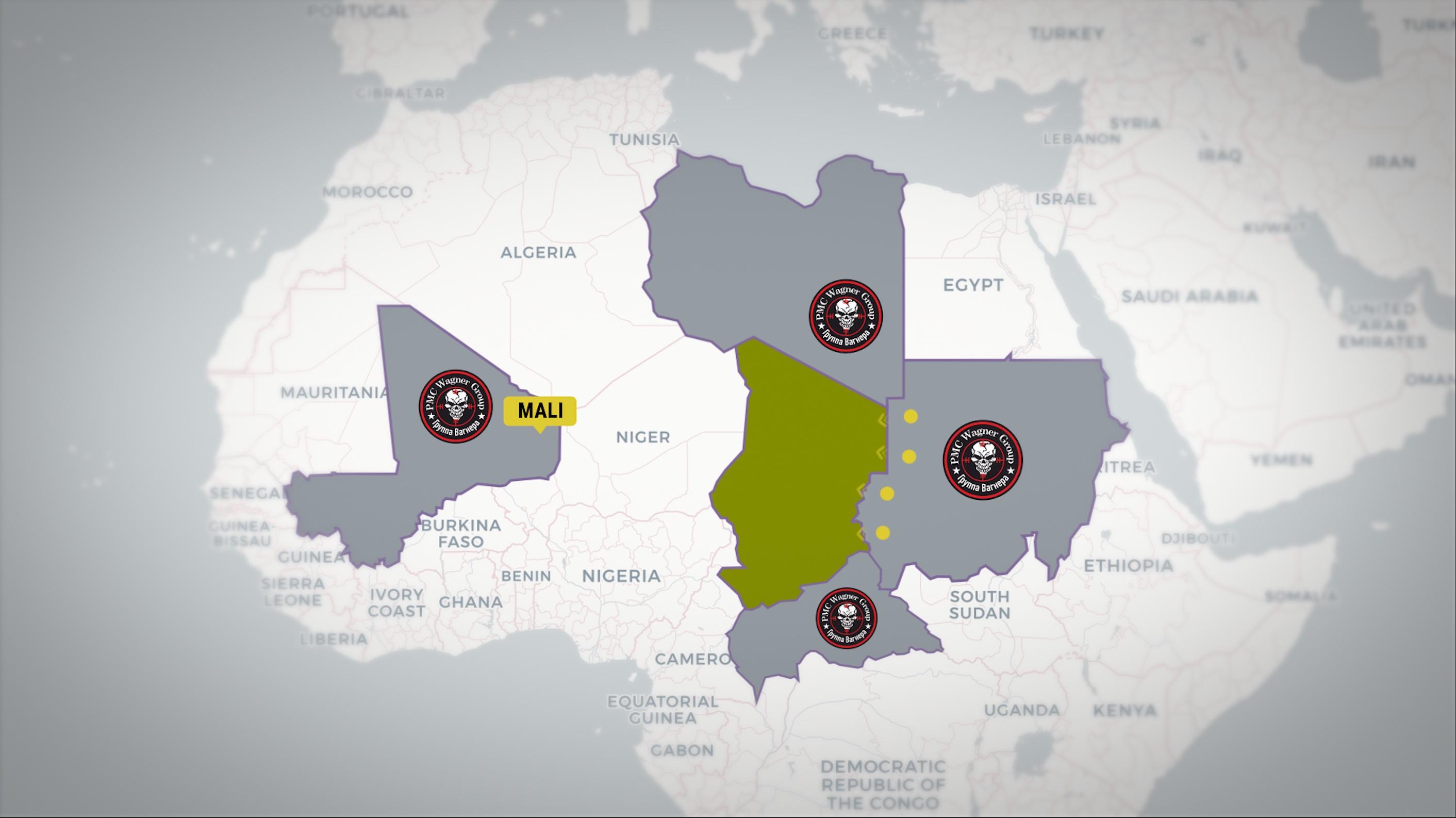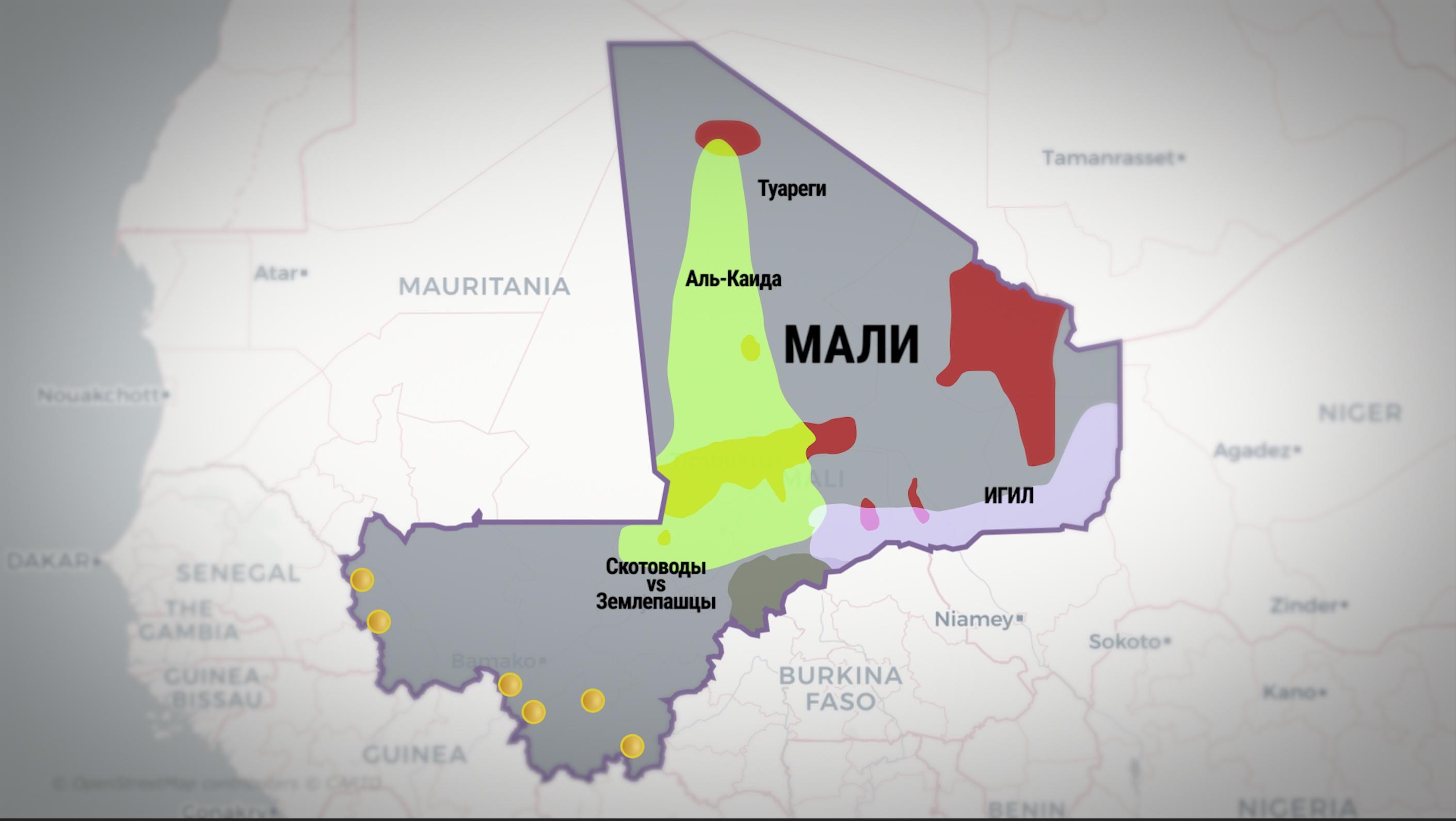In August 2020, events that took place in Mali were in many ways reminiscent of the Sudanese scenario: mass opposition protests began; the military seized the initiative and carried out a coup, promising to provide a civil government with a transit of power.
Then, one year later, the former comrades-in-arms ceased to be allies.
In May 2021, the military, under the leadership of Vice President Assimi Goit, overthrew the head of state Ba Ndao, so the transit of power was postponed until 2026.
In December 2021, it became known that Wagner fighters arrived in Mali, the military junta called them 'military consultants'.
Russian Foreign Minister Sergei Lavrov argued that the Kremlin had nothing to do with it, being forced to comment on the deal between Russian mercenaries and the Malians.
And in April 2022, the Mali authorities reported that they had received attack helicopters and mobile radar stations from Russia.
According to UN reports, this helped government troops, together with the Wagner Group, to achieve certain successes in the central and northern regions.
Оver 2022, the share of provinces in the central and northern parts of the country controlled by the authorities increased from 10%—20% to 44%.
War crimes allegations and withdrawal of peacekeepers
Russian mercenaries have been repeatedly accused of extrajudicial executions, human rights violations, and looting.
Thus, during the assault on the village of Mura in central Mali, 500 civilians were reportedly killed.
Such reprisals against the population, according to the opinions of some human rights activists, are beneficial to extremists who use social discontent for recruiting.
Experts attribute the surge in violence to the presence of Wagner PMCs in the region. Between June and September 2022, an al-Qaeda-linked group carried out more than 90 attacks against civilians and military personnel, compared to six in the same period a year earlier.
There are about a thousand Wagner PMC mercenaries in Mali, who are paid in total $11 million a month by the government, the news agency Reuters reported, referring to its source, in fall 2021.
PMC Wagner presence in the country and the failure of the junta to meet its obligations to hold elections — all this led to a weakening in Mali's relations with France, its European allies, and Canada.
In February 2022, they all announced the complete withdrawal of their forces involved in the counter-terrorist operations Barkhane and Takuba.
In August 2022, Germany suspended the mission of the Bundeswehr in Mali and demanded an explanation of the Russian forces' presence in the country.
In January 2023, experts cooperating with the UN called for an independent investigation into the activities of both Russian mercenaries and government forces.
Then on June 16, the Minister of Foreign Affairs of Mali demanded that the UN Security Council withdraw the international peacekeeping contingent from the country, since, according to the official, UN forces did not improve the situation in the country.
The United Nations Multidimensional Integrated Stabilization Mission in Mali has been operating in the republic since 2013 and was considered one of the most dangerous operations of the organization.
At the same time, the combat successes of Russian mercenaries are few. Despite their efforts, extremist activity in the country is on the rise, according to a report from the US Combating Terrorism Center.
However, Wagner Group seems to have been able to extend influence from Mali to gold-rich Burkina Faso, where the Russians have already been developing mines.
Gold and coups are honeypots for ‘military instructors’. Burkina Faso
Burkina Faso is one of the largest cotton producers in Africa. Cotton is the country's second source of income after gold.
In 2022, two military coups took place in Burkina Faso. As a result of the first, in January, the interim president, Lieutenant-Colonel Paul-Henri Damiba, has come to power.
After that, Russian flags began to appear on the streets. And Yevgeny Prigozhin was also accused of mass-targeted anti-Western propaganda on residents on social networks.
However, in September, President Paul-Henri Damiba was accused of being unable to cope with the jihadists, and then he was deposed by army Captain Ibrahim Traore took, who dissolved the transitional government and suspended the constitution.
The next self-proclaimed leader, the former commander of the Cobra special forces, Ibrahim Traore, unlike his predecessor, enjoys the support of PMC Wagner.
Having come to power at the age of 34, Traore became the youngest head of state in the world. He has already taken several notable steps: he allowed Russian billionaire Alexei Mordashov's Nordgold to mine gold, then denounced the agreement on the presence of the French armed forces, and invited Russian ‘military instructors’.
It's too early to talk about any military successes of the Wagner Group in Burkina Faso.
Overconfidentсe and defeat. Mozambique
The next country where the Wagner fighters checked in, situates in the southeast part of Africa. Mozambique is rich in gold and natural gas.
Here Russian mercenaries suffered perhaps the greatest defeat on the continent.
Since 2019, PMC Wagner has been set in Mozambique in order to fight radical extremists calling themselves Al-Shabab. They organized a series of attacks on the province of Cabo Delgado, rich in deposits of natural gas and valuable minerals.
PMC Wagner was contracted by the local government, but mercenaries were reportedly ambushed and suffered heavy losses.
The defeat of the Russian mercenaries in this area was explained by the fact that combat took place in both thick jungles and tight urban settings for which the group was not prepared. Before this, the militants fought mainly in the deserts and savannahs of northern and central Africa. They were unfamiliar with jungle combat and survival tactics, preferring to travel by helicopter than by foot.
In addition, poor integration with local forces was an extra case for the defeat. The mercenaries regarded local forces as being underprepared and ‘too undisciplined’.
The Rwandans, probably funded by France, changed Wagner PMC in Mozambique and finally stopped the militants' advance.
Despite the failure of Russian mercenaries in Mozambique, at the beginning of the year, the government of the Congo could reportedly ask them to help in the fight against rebels. Congo is the largest country in Africa after Algeria and one of the richest in the world in mineral resources.
Gold and diamonds in exchange for supporting the dictatorship
In Africa, PMC Wagner managed to gain a foothold in several countries: Sudan, Libya, the Central African Republic, as well as Mali, from where its influence now extends to Burkina Faso.
Moreover, the Wagner support the rebels in Chad. However, the simultaneous assistance of Yevgeny Prigozhin's private military company to African regimes and rebels, as a rule, does not create a significant preponderance of forces.
Mali can be considered the only military success of the Russian mercenaries, albeit with reservations. However, judging by media reports, the situation in the country is heating up.
The Central African Republic can be called an incomplete victory: before the arrival of the Rwandans, Wagner PMC did not achieve noticeable success there.
One may assume that, for employers, the main value of the Wagner Group is the support on behalf of the Kremlin of the dictators' power in exchange for control over deposits of gold, diamonds, and other valuable minerals and billions of dollars of profit, used, among other things, for the war in Ukraine.
What is the future of the African empire of PMC Wagner founder is a great question.
The Kremlin would likely seek to replace Prigozhin as the leader of the mercenaries and to maintain their ties on the continent to continue the operations they have begun, according to a report by the US Institute for the Study of War.
Perhaps, Prigozhin would go to Africa as a representative of Belarus.
He and Lukashenko "may have, or may already have, joint business interests" there, political observer Alexander Klasovsky supposes.
The Belarusian regime has long been interested in Africa, while Prigozhin has personal ties there and good experience in promoting the interests of the employer.




